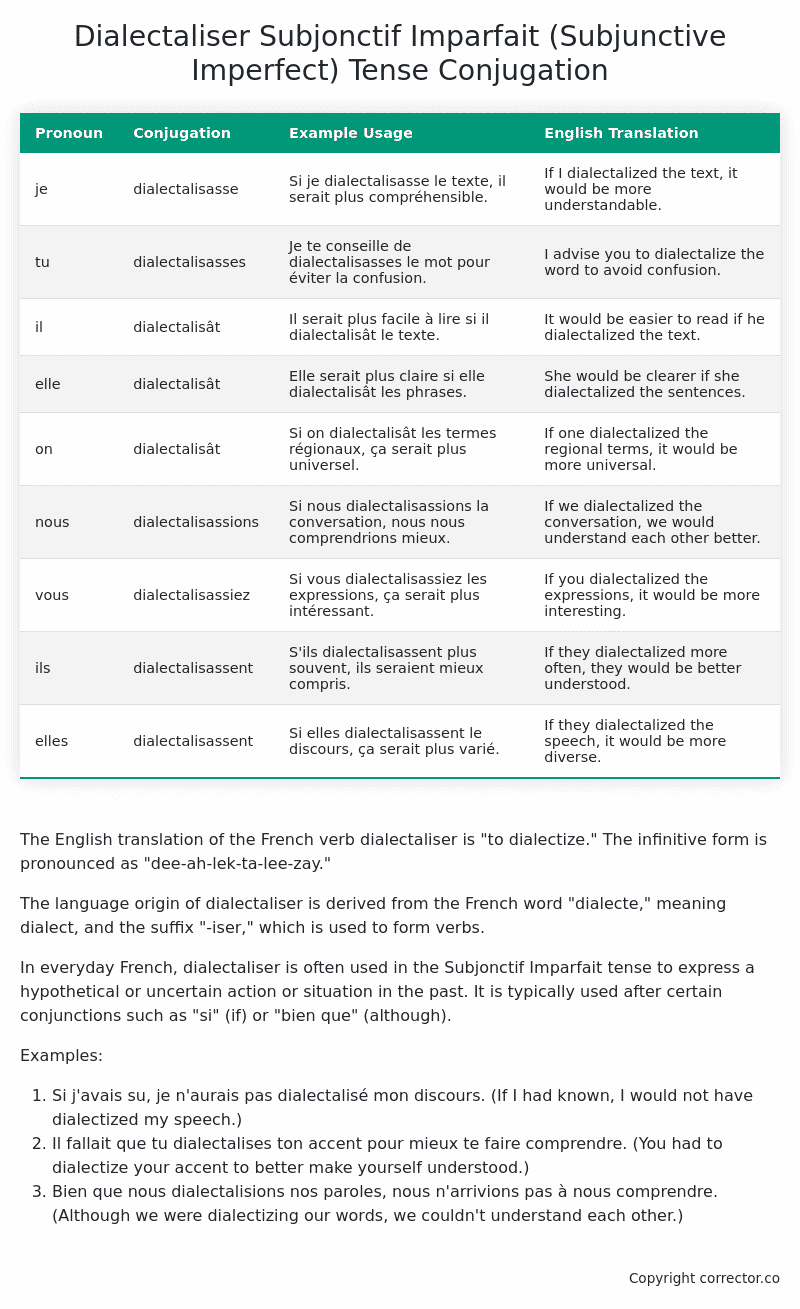Subjonctif Imparfait (Subjunctive Imperfect) Tense Conjugation of the French Verb dialectaliser
Introduction to the verb dialectaliser
The English translation of the French verb dialectaliser is “to dialectize.” The infinitive form is pronounced as “dee-ah-lek-ta-lee-zay.”
The language origin of dialectaliser is derived from the French word “dialecte,” meaning dialect, and the suffix “-iser,” which is used to form verbs.
In everyday French, dialectaliser is often used in the Subjonctif Imparfait tense to express a hypothetical or uncertain action or situation in the past. It is typically used after certain conjunctions such as “si” (if) or “bien que” (although).
Examples:
- Si j’avais su, je n’aurais pas dialectalisé mon discours. (If I had known, I would not have dialectized my speech.)
- Il fallait que tu dialectalises ton accent pour mieux te faire comprendre. (You had to dialectize your accent to better make yourself understood.)
- Bien que nous dialectalisions nos paroles, nous n’arrivions pas à nous comprendre. (Although we were dialectizing our words, we couldn’t understand each other.)
Table of the Subjonctif Imparfait (Subjunctive Imperfect) Tense Conjugation of dialectaliser
| Pronoun | Conjugation | Example Usage | English Translation |
|---|---|---|---|
| je | dialectalisasse | Si je dialectalisasse le texte, il serait plus compréhensible. | If I dialectalized the text, it would be more understandable. |
| tu | dialectalisasses | Je te conseille de dialectalisasses le mot pour éviter la confusion. | I advise you to dialectalize the word to avoid confusion. |
| il | dialectalisât | Il serait plus facile à lire si il dialectalisât le texte. | It would be easier to read if he dialectalized the text. |
| elle | dialectalisât | Elle serait plus claire si elle dialectalisât les phrases. | She would be clearer if she dialectalized the sentences. |
| on | dialectalisât | Si on dialectalisât les termes régionaux, ça serait plus universel. | If one dialectalized the regional terms, it would be more universal. |
| nous | dialectalisassions | Si nous dialectalisassions la conversation, nous nous comprendrions mieux. | If we dialectalized the conversation, we would understand each other better. |
| vous | dialectalisassiez | Si vous dialectalisassiez les expressions, ça serait plus intéressant. | If you dialectalized the expressions, it would be more interesting. |
| ils | dialectalisassent | S’ils dialectalisassent plus souvent, ils seraient mieux compris. | If they dialectalized more often, they would be better understood. |
| elles | dialectalisassent | Si elles dialectalisassent le discours, ça serait plus varié. | If they dialectalized the speech, it would be more diverse. |
Other Conjugations for Dialectaliser.
Le Present (Present Tense) Conjugation of the French Verb dialectaliser
Imparfait (Imperfect) Tense Conjugation of the French Verb dialectaliser
Passé Simple (Simple Past) Tense Conjugation of the French Verb dialectaliser
Passé Composé (Present Perfect) Tense Conjugation of the French Verb dialectaliser
Futur Simple (Simple Future) Tense Conjugation of the French Verb dialectaliser
Futur Proche (Near Future) Tense Conjugation of the French Verb dialectaliser
Plus-que-parfait (Pluperfect) Tense Conjugation of the French Verb dialectaliser
Passé Antérieur (Past Anterior) Tense Conjugation of the French Verb dialectaliser
Futur Antérieur (Future Anterior) Tense Conjugation of the French Verb dialectaliser
Subjonctif Présent (Subjunctive Present) Tense Conjugation of the French Verb dialectaliser
Subjonctif Passé (Subjunctive Past) Tense Conjugation of the French Verb dialectaliser
Subjonctif Imparfait (Subjunctive Imperfect) Tense Conjugation of the French Verb dialectaliser (this article)
Conditionnel Présent (Conditional Present) Tense Conjugation of the French Verb dialectaliser
Conditionnel Passé (Conditional Past) Tense Conjugation of the French Verb dialectaliser
L’impératif Présent (Imperative Present) Tense Conjugation of the French Verb dialectaliser
L’infinitif Présent (Infinitive Present) Tense Conjugation of the French Verb dialectaliser
Struggling with French verbs or the language in general? Why not use our free French Grammar Checker – no registration required!
Get a FREE Download Study Sheet of this Conjugation 🔥
Simply right click the image below, click “save image” and get your free reference for the dialectaliser Subjonctif Imparfait tense conjugation!

Dialectaliser – About the French Subjonctif Imparfait (Subjunctive Imperfect) Tense
Formation
Common Everyday Usage Patterns
Interactions with Other Tenses
Subjonctif Présent
Indicatif Passé Composé
Conditional
Conditional Perfect
Summary
I hope you enjoyed this article on the verb dialectaliser. Still in a learning mood? Check out another TOTALLY random French verb conjugation!


